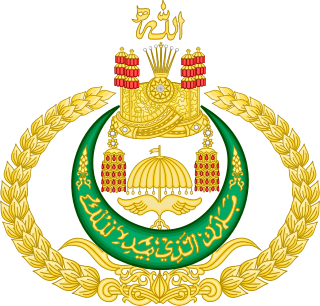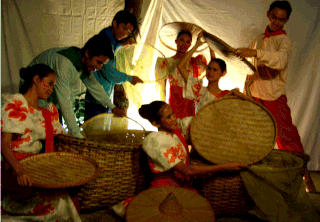Usage
Dayang is used in formal situation as a mark of respect for non-royal and non-noble females in Brunei. Generally, it is addressed immediately before the person's given name. If the name includes titles, the order of Dayang is after all of the titles which precede the name. However, this excludes the title Hajah; in this case, Dayang is placed before it.

Hajji (الحجّي) is a title which is originally given to a Muslim person who has successfully completed the Hajj to Mecca. It is also often used to refer to an elder, since it can take time to accumulate the wealth to fund the travel, and in many Muslim societies as an honorific title for a respected man. The title is placed before a person's name; for example Joshua Omo becomes Hajji Joshua Omo.
The honorific Dayang is often found with the Malay style Yang Mulia, which is an honorary style also for the commoners. However, they may not be necessarily consecutive; Yang Mulia is always addressed at the beginning of the name system, and this includes preceding any available title.
If the person already has Dayang as part of her birth name, it is not required to add this honorific as it will become repetitive.
A courtesy title is a form of address in systems of nobility used for children, former wives and other close relatives of a peer, as well as certain officials such as some judges and members of the Scottish gentry. These styles are used 'by courtesy' in the sense that the relatives, officials and others do not themselves hold substantive titles. There are several different kinds of courtesy titles in the British peerage.
A style of office, honorific or manner/form of address, is an official or legally recognized form of address, and may often be used in conjunction with a title. A style, by tradition or law, precedes a reference to a person who holds a post or political office, and is sometimes used to refer to the office itself. An honorific can also be awarded to an individual in a personal capacity. Such styles are particularly associated with monarchies, where they may be used by a wife of an office holder or of a prince of the blood, for the duration of their marriage. They are also almost universally used for presidents in republics and in many countries for members of legislative bodies, higher-ranking judges and senior constitutional office holders. Leading religious figures also have styles.

"Allah Peliharakan Sultan" is the national anthem of Brunei Darussalam. The anthem is sung in Malay, the national language of the country. It was written by Pengiran Haji Mohamed Yusuf bin Pengiran Abdul Rahim and composed by Haji Awang Besar bin Sagap in 1947. The song was adopted in 1951 as the national anthem of the British protectorate of Brunei. It was adapted as the national anthem of Brunei Darussalam upon independence from the United Kingdom, and was sung as the national anthem of the independent state at the stroke of midnight 1 January 1984.
The Malay language has a complex system of styles, titles and honorifics, which are used extensively in Brunei and Malaysia. Singapore, whose Malay royalty was abolished by the British colonial government in 1891, has adopted civic titles for its leaders. The Philippines historically used Malay titles during its pre-Hispanic period, as evidenced by the titles of historical figures such as Rajah Sulayman, Lakandula and Dayang Kalangitan. Malay titles are still used by the royal houses of Sulu, Maguindanao, Buayan, and Maranao on the southern Philippine island of Mindanao, but these are retained on a traditional basis, as the 1987 Constitution explicitly reaffirms the abolition of royal and noble titles in the republic. Indonesia, meanwhile, as a republic, does not recognize hereditary rulers and aristocratic systems. Nevertheless, their royal titles and honors are still used as courtesy titles.

Raja Permaisuri Agong (Jawi: راج ڤرمايسوري اݢوڠ; full title: Kebawah Duli Yang Maha Mulia Seri Paduka Baginda Raja Permaisuri Agong; سري ڤدوک بݢيندا راج ڤرمايسوري اݢوڠ is the title given to the consort of the Yang di-Pertuan Agong, the elected, constitutional head of state of Malaysia.
Permaisuri Siti Aishah was the consort of the 11th Yang di-Pertuan Agong of Malaysia, Sultan Salahuddin Abdul Aziz Shah. She is the youngest ever Raja Permaisuri Agong (Queen) of Malaysia, ascending the throne at the age of 28 on 26 April 1999. During her reign as Raja Permaisuri Agong, she was known as Tuanku Siti Aishah.
Ratu (raatuu) is an Austronesian title used by Fijians of chiefly rank. An equivalent title, Adi, is used by females of chiefly rank. In the Malay language, the title Ratu is also the traditional honorific title to refer to the ruling king or queen in Javanese culture. Thus in Java, a royal palace is called "keraton", constructed from the circumfix ke- -an and Ratu, to describe the residence of the Ratu.

Pengiran Anak Isteri Pengiran Anak Sarah is the wife of the Crown Prince of Brunei, Al-Muhtadee Billah. As the daughter of a distant member of the royal family, she was regarded as a commoner. While attending a pre-university course at 17, she married the Crown Prince. The couple have four children.
Thai royal and noble titles are the royal and noble styles indicating relationship to the king which were introduced by King Trailokanat. The system is rooted in the Thai language equivalent of feudalism, sakdina. Borne of a polygamous royal tradition in which monarchs and noblemen often had dozens of children, such royal and noble titulary is similar to Western concepts of peerage. A title of honor may not be confined to the beginning or the end of the name, but may be split across the name. Those with titles ceased to be known by personal names, and were referred to by the awarded title. The King could bestow a title on anyone, although such promotion was personal and the person's children would not normally benefit from it. The complex and nuanced distinctions in rank of the titles are largely uncaptured by their glosses into Western-style terms. With the exception of a handful of titles for women, the bestowal of noble titles ended after the Siamese revolution of 1932, and the adoption of monogamy resulted in far fewer royal consorts and issue who could receive such styles. As a result, the old titles are obscure even to most Thais.
Majesty is an English word derived ultimately from the Latin maiestas, meaning greatness, and used as a style by many monarchs, usually kings or sultans. Where used, the style outranks the style of (Imperial/Royal) Highness, but is inferior to the style of Imperial Majesty. It has cognates in many other languages, especially Indo-European languages of Europe.
The Japanese language makes use of honorific suffixes when referring to others in a conversation. These suffixes are attached to the end of names, and are often gender-neutral. Honorific suffixes also indicate the level of the speaker and referred individual's relationship and are often used alongside other components of Japanese honorific speech, called keigo (敬語).
The 1999 Southeast Asian Games, officially known as the 20th Southeast Asian Games, was a Southeast Asian multi-sport event held in Bandar Seri Begawan, Brunei Darussalam. This was the first time Brunei hosted the Southeast Asian Games and also in Borneo island.
The Korean language reflects the important observance of a speaker or writer's relationships with both the subject of the sentence and the audience. Korean grammar uses an extensive system of honorifics to reflect the speaker's relationship to the subject of the sentence and speech levels to reflect the speaker's relationship to the audience. Originally, the honorifics expressed the differences in social status between speakers. In contemporary Korean culture, honorifics are used to differentiate between the formal and informal speech based on the level of familiarity between the speaker and the listener.
Personal names in Malaysia vary greatly according to ethno-cultural group. Personal names are, to a certain degree, regulated by the national registration department, especially since the introduction of the National Registration Identity Card (NRIC).

Pengiran Muda Abdul Muntaqim ibn Al-Muhtadee Billah is the oldest child and first son of Al-Muhtadee Billah, heir to the Sultan of Brunei, and his wife, Sarah, Crown Princess of Brunei. He has a younger sister, Princess Muneerah Madhul, who was born in 2011. The Prince is second-in-line to become Sultan of Brunei after his father Al-Muhtadee Billah.His father is heir to Abdul Muntaqim's grandfather Sultan Haji Hassanal Bolkiah of Brunei.
In linguistics, an honorific is a grammatical or morphosyntactic form that encodes the relative social status of the participants of the conversation. Distinct from honorific titles, linguistic honorifics convey formality FORM, social distance, politeness POL, humility HBL, deference, or respect through the choice of an alternate form such as an affix, clitic, grammatical case, change in person or number, or an entirely different lexical item. A key feature of an honorific system is that one can convey the same message in both honorific and familiar forms—i.e., it is possible to say something like "The soup is hot" in a way that confers honor or deference on one of the participants of the conversation.
Honorifics are a class of words or grammatical morphemes that encode a wide variety of social relationships between interlocutors or between interlocutors and referents. Honorific phenomena in Thai include honorific registers, honorific pronominals, and honorific particles.

In the Philippine languages, the Filipino honorific styles and titles are a complex system of titles and honorifics, which are used extensively during pre-colonial era, mostly the Tagalogs and Visayans borrowed the Malay language systems of honorifics specially the Moro peoples of Mindanao based on the Indianised Sanskritised Indian honorifics system, in addition to the Chinese systems of honorifics in like the Ma-i (Mindoro) and the Pangasinan. Indian influence is evidenced by the titles of historical figures such as Rajah Sulayman, Lakandula and Dayang Kalangitan. Malay titles are still used by the royal houses of Sulu, Maguindanao, Maranao and Iranun on the southern Philippine island of Mindanao, but these are retained on a traditional basis as the 1987 Constitution explicitly reaffirms the abolition of royal and noble titles in the republic.






